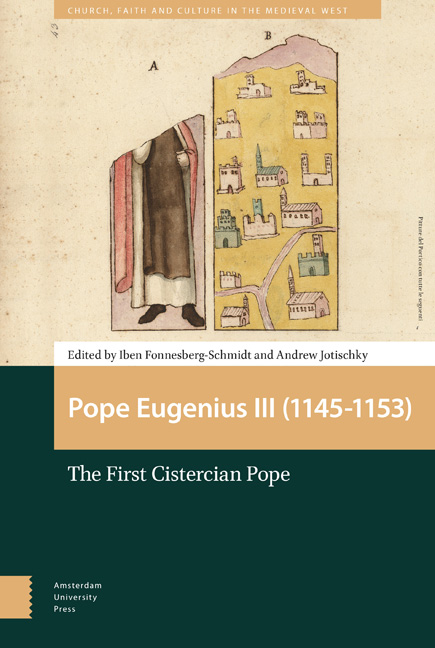Book contents
- Frontmatter
- Contents
- Preface
- Abbreviations
- Maps and Figures
- Introduction
- 1 ‘Justinian’s Laws, not the Lord’s’: Eugenius III and the Learned laws
- 2 Curial Politics and Papal Power : Eugenius III, the Curia, and Contemporary Theological Controversy
- 3 The Cistercians, Eugenius III, and the Disputed York Election
- 4 Eugenius III and the Crusades to the East
- 5 Eugenius III and the Northern Crusade
- 6 The Benefits of Exile
- 7 Eugenius III and France: the Protected Protector
- 8 A Golden Rose and the Deaf Asp that Stoppeth her Ears: Eugenius III and Spain
- 9 Eugenius III and the Roman Commune
- 10 Eugenius III Reclaims the Patrimony of St Peter
- 11 Eugenius III’s Privileges to Cistercian Houses
- 12 Eugenius III at Cîteaux, 1147
- 13 Eugenius III and the Church in the Crusader States
- Index
5 - Eugenius III and the Northern Crusade
Published online by Cambridge University Press: 22 December 2020
- Frontmatter
- Contents
- Preface
- Abbreviations
- Maps and Figures
- Introduction
- 1 ‘Justinian’s Laws, not the Lord’s’: Eugenius III and the Learned laws
- 2 Curial Politics and Papal Power : Eugenius III, the Curia, and Contemporary Theological Controversy
- 3 The Cistercians, Eugenius III, and the Disputed York Election
- 4 Eugenius III and the Crusades to the East
- 5 Eugenius III and the Northern Crusade
- 6 The Benefits of Exile
- 7 Eugenius III and France: the Protected Protector
- 8 A Golden Rose and the Deaf Asp that Stoppeth her Ears: Eugenius III and Spain
- 9 Eugenius III and the Roman Commune
- 10 Eugenius III Reclaims the Patrimony of St Peter
- 11 Eugenius III’s Privileges to Cistercian Houses
- 12 Eugenius III at Cîteaux, 1147
- 13 Eugenius III and the Church in the Crusader States
- Index
Summary
Abstract
The Second Crusade, of which the Wendish Crusade against the pagan Slavs formed a vital part, was envisioned as a three-pronged attack on the enemies of Christendom. In his letter, Divini dispensatione, Eugenius acknowledged the redemptive power of the crusade and revealed his concerns for the motivation of crusaders. He linked this crusade in the North not only to the crusade to the Holy Land but also to the warfare between Christians and Muslims on the Iberian peninsula. Rather than presenting a view of the three campaigns as separate albeit contemporary efforts, he stressed that all three must be understood as a joint ‘storm against the infidels’. In this way Eugenius significantly reinterpreted the entire crusading effort for his successors.
Keywords: Wends; Wendish Crusade; Second Crusade; Bernard of Clairvaux; Anselm of Havelberg
In March 1147 a Diet met in Frankfurt. It had been called by King Conrad III of Germany (1138–52) who recently had taken the Cross to go to the Holy Land and now wished to settle his affairs before his departure. The assembly was attended by the princes and bishops of the realm, a papal legate, and Abbot Bernard of Clairvaux (†1153), who had been entrusted with the recruitment for the crusade to the East. The grand occasion provided an opportunity for enlisting more crusaders from the German lands, but some nobles from northern Germany did not heed Bernard's appeals. Instead they asked to take up arms against their pagan neighbours, the Slavs. In a letter written shortly afterwards, Bernard recounted the events at Frankfurt and wrote that now:
the might of Christians is being armed against [the pagans], and that for the complete wiping out or assuredly the conversion of these peoples, they have put on the sign of our salvation; and we promised them the same indulgence for sin as [that granted] to those who set out towards Jerusalem.
Soon after the meeting Pope Eugenius III issued a letter endorsing the campaign, and in the summer of 1147 the so-called Wendish Crusade set out.
The Wendish expedition was well known to the historians of the late nineteenth and early twentieth centuries who worked on the political history of the lands in north-eastern Europe as well as to those who made the German Ostmission their subject.
- Type
- Chapter
- Information
- Pope Eugenius III (1145–1153)The First Cistercian Pope, pp. 147 - 170Publisher: Amsterdam University PressPrint publication year: 2018



